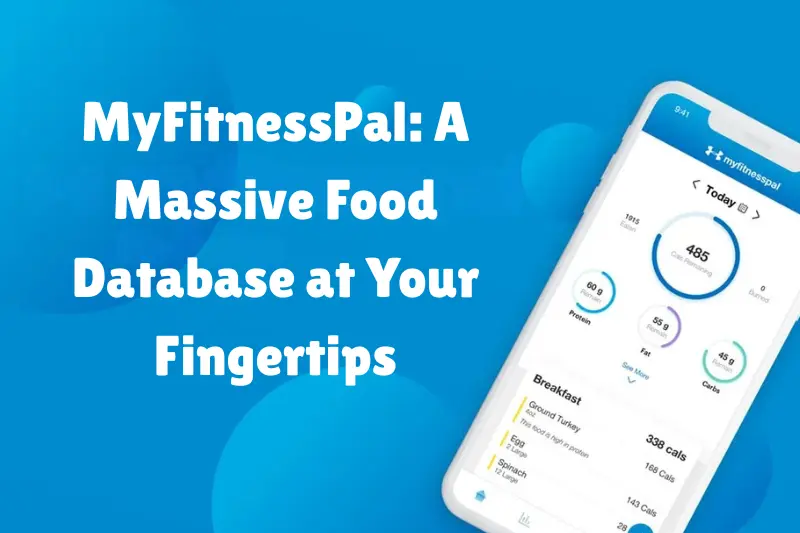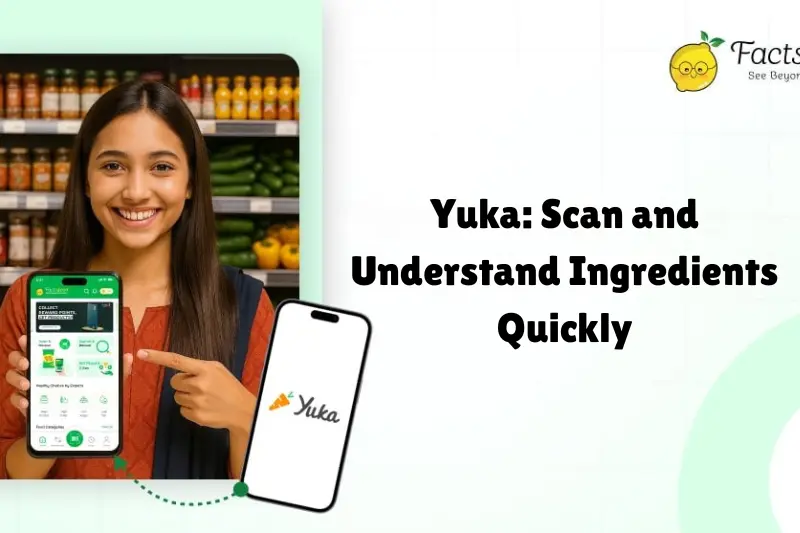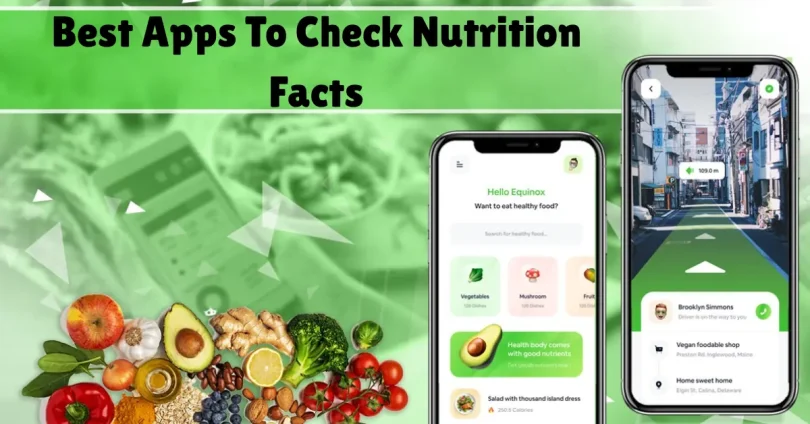In today’s fast-paced world, keeping track of what you eat can feel like a full-time job. Between busy schedules, work deadlines, social commitments, and family responsibilities, it’s easy to lose track of what goes on your plate. Whether your goal is weight management, building muscle, improving energy levels, or simply eating healthier, understanding the nutritional content of your food is essential.
Thankfully, technology is here to help. The best apps to check nutrition facts allow you to analyze meals, monitor calorie intake, track nutrients, and even make smarter grocery choices—without spending hours reading food labels or calculating macros manually.
Let’s explore some top-rated options that can make healthy eating simpler, smarter, and more enjoyable.
1. MyFitnessPal: A Massive Food Database at Your Fingertips

If you want an all-in-one app for nutrition tracking, MyFitnessPal is hard to beat. This app has one of the largest food databases available, containing millions of items, from packaged snacks to restaurant meals.
- Why it’s great: MyFitnessPal helps you log meals quickly and see macronutrients—like carbohydrates, protein, and fats—at a glance. You can set personalized daily goals, track progress, and even connect it to fitness trackers or smartwatches.
- User-friendly tip: Take advantage of the barcode scanner to instantly log packaged foods, making meal tracking faster and hassle-free.
Pro tip: MyFitnessPal also offers community support, recipes, and meal ideas, making it a great tool not just for tracking but also for learning about healthier eating patterns.
2. Cronometer: Perfect for Detailed Nutrient Tracking
For those who are serious about micronutrients, Cronometer is a standout option. Unlike apps that only focus on calories and macros, Cronometer provides detailed insights into vitamins, minerals, and other nutrients that are often overlooked.
- Why it’s great: It’s ideal for anyone with specific dietary needs, such as vegans, athletes, or people managing health conditions that require precise nutrient intake.
- User-friendly tip: Use Cronometer to track nutrient deficiencies, ensuring you meet your daily targets for optimal health.
Pro tip: The app also tracks water intake, exercise, and biometrics, giving you a comprehensive view of your health in one place.
3. Yuka: Scan and Understand Ingredients Quickly

Sometimes you just need a quick, simple check without logging every detail. That’s where Yuka shines. By scanning barcodes, Yuka provides instant scores based on nutrition, additives, and ingredients, making it easier to make healthier food choices.
- Why it’s great: Yuka’s straightforward rating system helps you quickly compare products and choose the best options at a glance.
- User-friendly tip: Pair Yuka with your favorite diet tracking app to stay informed while grocery shopping.
Pro tip: Yuka also evaluates cosmetic products and supplements, so it’s a handy tool beyond just food tracking.
4. Calorie Counter by MyNetDiary & Lose It!: Track Calories and Macros Easily
If you want detailed tracking combined with convenience, Calorie Counter by MyNetDiary and Lose It! are excellent choices. Both apps allow you to log meals, track calories, and monitor macronutrient intake effortlessly.
- Why they’re great: They provide visual charts of your progress, reminders to log meals, and insights into nutrient consumption. These apps make it simple to see how each meal contributes to your daily goals.
- User-friendly tip: Set reminders to log meals consistently, so you don’t miss tracking any important nutrients.
Pro tip: Both apps integrate with wearable devices, giving you a clear view of your energy balance and fitness goals in real time.
5. AI-Powered Apps: Calory Ai & Foodvisor
For those who want a more futuristic approach, Calory Ai and Foodvisor use AI and image recognition to analyze meals directly from photos. Simply snap a picture of your plate, and the apps provide estimated calories and macronutrient breakdowns.
- Why they’re great: Perfect for busy people who want fast, visual feedback without manual logging.
- User-friendly tip: While the AI estimates are convenient, double-check values if you require precise tracking for specific diets or health goals.
Pro tip: Use these apps for quick meal logging on-the-go and combine them with detailed tracking apps for the most accurate results.
You may also like to read this:
Top Processed Food Brands In The Market Leading Innovation
What Nutrition Facts Mean on Food Labels – Complete Guide
How To Read Nutrition Facts Properly: Full Guide
Types of Hidden Ingredients In Processed Foods You Must Know
Why Calories on Labels Can Be Confusing Explained
How to Choose the Right App for You
With so many options, choosing the right app can feel overwhelming. Here are some tips to simplify the decision:
- Define your goals: Are you aiming for weight loss, muscle gain, overall healthy eating, or just awareness of your nutrition?
- Check usability: Choose an app with an interface that is intuitive and enjoyable to use daily.
- Determine your preferred detail level: Do you want basic calorie tracking, or do you need in-depth micronutrient analysis?
- Consider convenience features: Barcode scanners, AI-powered photo recognition, or simple scoring systems can save time and keep you consistent.
- Test multiple apps: Most apps offer free trials. Experiment to see which one fits your lifestyle best.
Additional Tips for Using Nutrition Apps Effectively
While having the best apps to check nutrition facts is a great start, getting the most out of them requires some smart strategies. Here’s how you can maximize your app experience:
1. Be Consistent with Logging
Consistency is key. Logging every meal, snack, and drink—even if it feels tedious at first—gives you accurate insights into your diet. Over time, patterns will emerge, helping you make smarter food choices.
Tip: Set a daily reminder in the app to log meals immediately after eating, so nothing gets forgotten.
2. Pay Attention to Portion Sizes
Apps are only as accurate as the data you provide. Make sure to measure portions correctly, especially for items like oils, nuts, or restaurant meals.
Tip: Use a kitchen scale or measuring cups for precision, and update your app entries with the correct portion size.
3. Focus on Nutrient Quality, Not Just Calories
While calorie tracking is helpful, nutrition apps can also provide insight into the quality of your food. Look at vitamins, minerals, fiber, and protein content to ensure you’re fueling your body properly.
Tip: Use apps like Cronometer or MyFitnessPal to track micronutrients and identify areas for improvement.
4. Combine Apps for Maximum Benefits
Different apps serve different purposes. For instance, Yuka can help you make quick grocery decisions, while MyFitnessPal tracks long-term nutrition. Combining apps allows you to cover all angles of healthy eating.
Tip: Start with one primary tracking app and supplement it with another for specialized needs, like ingredient evaluation or AI meal analysis.
5. Learn from Your Data
Nutrition apps don’t just track—they teach. Review your logged meals regularly to notice trends, strengths, and areas for improvement. Over time, this data can guide smarter choices, such as swapping low-nutrient snacks for nutrient-dense alternatives.
Tip: Export or view weekly reports to track progress toward your goals and adjust as needed.
Benefits of Using Nutrition Apps
Using apps to check nutrition facts comes with numerous advantages:
- Time-saving: Quickly scan or log foods without manual calculations.
- Accountability: Seeing daily intake in real time helps you stay on track.
- Informed choices: Understand what you’re eating beyond calories, including sugar, sodium, and fiber content.
- Goal tracking: Align your meals with weight, fitness, or health goals.
- Education: Learn about ingredients, nutrient values, and healthier alternatives over time.
With these benefits, it’s clear that a reliable nutrition app is more than just a tool—it’s a personal nutrition assistant in your pocket.
Conclusion
Maintaining a healthy diet doesn’t have to be complicated or time-consuming. Using the best apps to check nutrition facts, like MyFitnessPal, Cronometer, Yuka, or AI-powered tools like Foodvisor, you can gain complete control over your nutrition, stay consistent with your goals, and make smarter food choices effortlessly.
The key is to find an app that suits your lifestyle, fits your goals, and makes tracking intuitive rather than stressful. Once you find your ideal tool, healthy eating becomes not just manageable—but genuinely enjoyable.
Start today, explore these apps, and watch how a simple digital tool can transform the way you approach nutrition and overall health!
FAQs
1. What are the best apps to check nutrition facts?
Some of the top apps include MyFitnessPal, Cronometer, Yuka, Calorie Counter by MyNetDiary, Lose It!, and AI-powered tools like Foodvisor and Calory Ai. These apps help you track calories, macronutrients, vitamins, and other essential nutrients.
2. Are nutrition apps accurate?
Most nutrition apps are reasonably accurate for general tracking, especially when logging packaged foods using barcode scanners. However, estimates can vary for homemade meals or restaurant dishes. For precise tracking, measure portions carefully and double-check entries.
3. Can I use these apps for weight loss?
Yes! Apps like MyFitnessPal, Lose It!, and MyNetDiary allow you to set weight-loss goals, track calories, and monitor your macronutrient intake, making it easier to achieve sustainable results.
4. Do these apps track micronutrients?
Yes. Apps like Cronometer provide detailed tracking of vitamins, minerals, and other micronutrients that are often overlooked in standard calorie trackers. This is especially helpful for people with specific dietary needs.
5. Are AI-powered nutrition apps reliable?
AI-powered apps like Foodvisor and Calory Ai use photo recognition to estimate calories and nutrients. They are convenient for quick meal logging, but results can be slightly less precise than manual entry. They work best as a supplement to detailed tracking apps.




